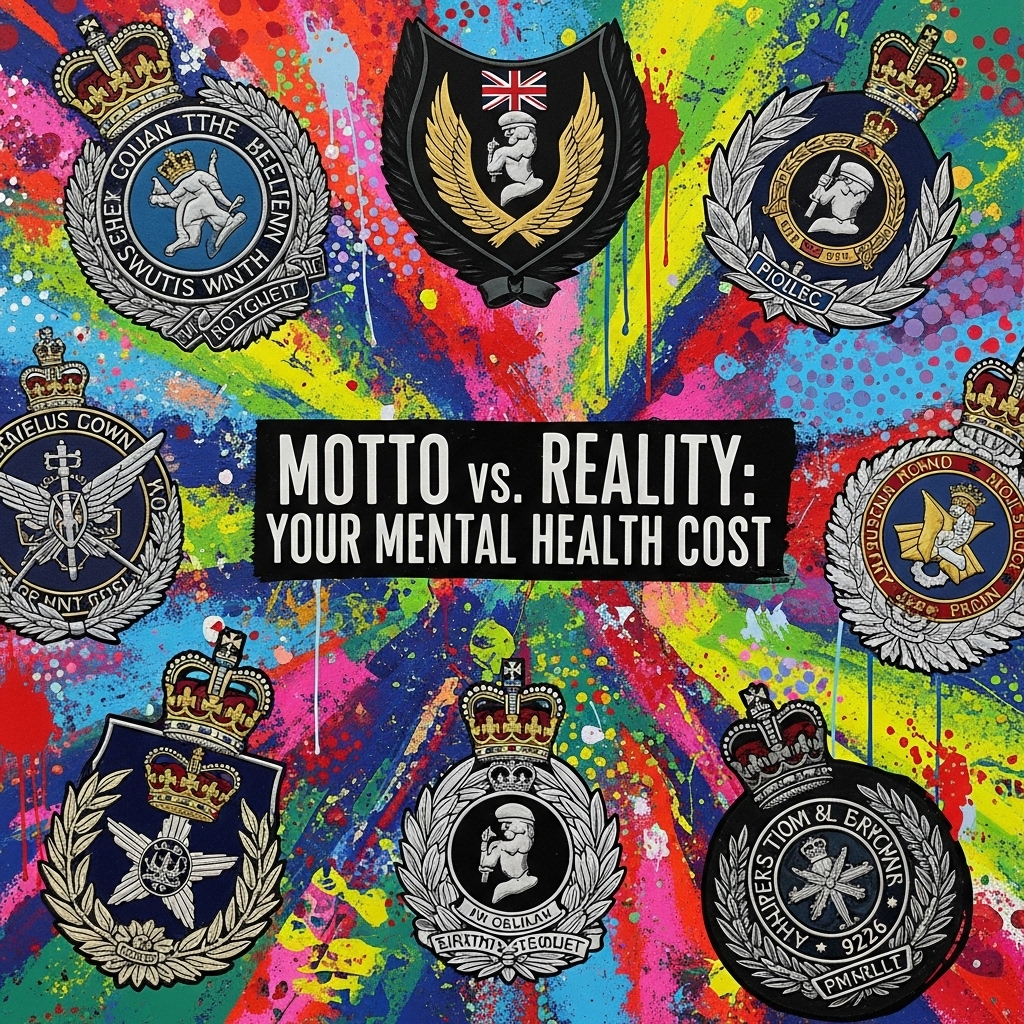
Think of the military mottos that become ingrained: the Royal Marines’ ‘Per Mare, Per Terram’ (By Sea, By Land), or the Parachute Regiment’s ‘Utrinque Paratus’ (Ready for Anything). These aren’t just words; they’re the very soul of a unit, shaping individuals with values and commitment. If you’re a professional driven by principles, what happens when that sense of duty becomes a silent, crushing burden? When your integrity and work ethic consistently clash with a workplace culture that simply doesn’t share your level of commitment? The answer, for far too many high-achievers, is a hidden battle with chronic stress, anxiety, and even the lingering shadows of trauma.
The core identity of any organisation is often encapsulated in its motto – those concise phrases meant to inspire, unify, and guide. But what happens when the spirit of these words, or the lack of, creates a chasm between your personal values and your daily reality? For many, especially those transitioning from highly disciplined environments like the military into other demanding sectors, this clash isn’t just frustrating; it can be a significant, silent contributor to stress, anxiety, and even complex trauma (CPTSD) or PTSD.
Military Mottos and Deep Conditioning
Consider the UK military. Their mottos are far more than just words; they are the very bedrock upon which identity, discipline, and unwavering loyalty are built. Take the Royal Marines’ “Per Mare, Per Terram” (By Sea, By Land) or the Parachute Regiment’s “Utrinque Paratus” (Ready for Anything). These aren’t just statements of capability; they embody an indomitable spirit, readiness, and commitment.
What makes these mottos so potent? It’s the relentless reinforcement throughout a soldier’s career. From the moment recruits step into basic training, these values are woven into every fibre of their being. Discipline isn’t merely taught; it’s ingrained through rigorous training, shared hardship, and the absolute necessity of cohesion. You live and breathe your unit’s motto. It becomes a shorthand for the expectations, the sacrifices, and the sense of belonging. This is the branding, branded not onto a uniform, but into the soul.
This deep conditioning creates a sense of purpose and resilience. However, for some, this intense internalisation of values can also make adaptation challenging when stepping into environments with a less defined or less universally upheld ethos. The stark contrast can become a source of underlying stress, an internal conflict between what you’ve been taught to embody and what you now see around you.
Policing Mottos: A Shift in Focus?
Now, let’s turn to UK policing. My own journey brought me from the Royal Military Police (RMP) with their motto “Exemplo Ducemus” (By Example We Lead) – a clear statement of personal responsibility and leadership by example. This motto, much like military ones, places emphasis squarely on the individual’s conduct and integrity.

I observed a significant shift, exemplified by the Metropolitan Police’s motto in the 2000s: “Working Together for a Safer London.” While undeniably a noble and desirable public outcome, this motto feels distinctly outward-facing. It’s a promise to the public, a statement of service delivery. For me, it seemed more about what they thought the public should see than an internal rallying cry for the officers themselves.
Many contemporary UK police mottos tend to follow this pattern. They focus on community engagement, public safety, and collaboration. While these are vital aspects of modern policing, the critical difference is that they often don’t seem designed to instil the same deep, personal sense of identity and unwavering discipline in their members that military mottos do. It’s less about moulding the individual’s internal compass and more about defining the external service offered ‘a tagline!’.
This isn’t to say police forces lack values, but rather that the way these values are articulated and reinforced may differ significantly. For someone accustomed to a soul-deep integration of organisational ethos, this can create a disconnect. This disconnect, this constant internal tension, can act as a stressor to anxiety, as you try to reconcile your ingrained sense of duty with an environment that doesn’t consistently mirror it.
The Frustration of Unmatched Values: To Stress, Anxiety & Trauma
My personal experience perfectly illustrates the impact of this cultural divergence on mental well-being. When you transition from an environment where discipline is ingrained, where values are upheld as a matter of personal honour, to one where those same values are not universally shared or explicitly championed, it creates a palpable sense of frustration and often, deep strain.
You step across, carrying your ‘corps values’ – your discipline, your commitment, your drive to do your best for your team. You expect to find a similar level of dedication, a shared understanding of what it means to be professional. But then, as you observe, “others around you don’t hold the same values or even any values.”
This is where the real psychological toll begins. You’re striving to uphold your standards, to elevate the team, to achieve excellence. Yet, you see colleagues who don’t share that same drive, who might do the bare minimum, or worse, actively undermine efforts. The natural response for someone with my background is to step up. You can’t let standards drop; it goes against your very nature. You pick up the slack, work extra hours, take on more, because you genuinely care about the outcome and the integrity of the work.
Here’s the sad part: management often relies on this. They know who the grafters are, who the dedicated professionals are. They understand that people like you won’t let things fall apart. So, they implicitly or explicitly encourage you to take on that extra stress, to work beyond your remit, to bring work home. Why? Because it means they don’t have to address the underlying issues of disengagement or lack of accountability in others. They rely on your professionalism to fill the gaps, to keep the “trains” running. They’re happy for you to work extra hours because “no one else will get it done.”
This dynamic, while common in many high-pressure workplaces, becomes particularly acutely felt when you’ve come from an environment where collective responsibility and shared values are paramount. The burden becomes yours, not just of the workload, but of the emotional labour of trying to maintain standards in a system that isn’t necessarily built to support them. This chronic state of over-responsibility, unacknowledged effort, and moral injury (the distress from witnessing or participating in acts that violate your moral code) can directly lead to burnout, generalised anxiety, and in severe or prolonged cases, contribute to the development of Complex PTSD (CPTSD). It’s a sustained psychological assault on your core being.
The Liberating Realisation: Reclaiming Your Mental Space
And then comes the moment of clarity, the realisation, I use a quote I heard a Light Dragoon Major use on the radio to the UN..: “it’s not your train, and its not your trainset.” This isn’t about apathy; it’s about self-preservation and a re-evaluation of your role and responsibility to protect your own mental health.
This realisation is liberating. It’s the moment you understand that while your corps values are deeply embedded within you, they are your values. It’s not your job to force them upon an organisation or individuals who don’t embrace them. You can maintain your integrity, your work ethic, and your standards, but you don’t have to carry the emotional and physical weight of an entire system that isn’t operating on the same level.
When you step back, the immense pressure, and with it, much of the stress and anxiety, begins to dissipate. You still approach your work with professionalism and dedication, because that’s who you are. But you stop taking on the stress of others’ shortcomings. You stop feeling personally responsible for systemic failures. You understand that your commitment is to your work, your standards, and your well-being, rather than being beholden to an organisation that might be happy to exploit your dedication.
This shift in perspective can make you “care less” in a healthy way – less about the outcome of others’ apathy, and value more maintaining your own equilibrium. You continue to be the professional you are, but you draw a clear boundary. You offer your best, but you don’t offer your soul to an organisation that doesn’t share your core ethos.
I’ll always be the type to go that bit further, to put in the extra effort when it matters. That’s just ingrained in me. But, towards the end of my policing career, I made a conscious choice. If I couldn’t get it done in the time the job thought they paid me for, then I was genuinely happy to down tools and enjoy my personal time without any regrets. It wasn’t about shirking responsibility; it was about recognising the boundaries of my own well-being and acknowledging that my dedication shouldn’t be exploited at the expense of my mental health.
I highlight the crucial difference between an organisation that moulds its members through its ethos, and one that simply uses mottos as a public-facing statement. It underscores the importance of recognising when the demands of your role are impacting your mental health, and how to step back to protect your own well-being.
Perhaps you, like many others I work with, have found yourself stuck in a cycle of chronic stress, anxiety, or even the lingering effects of trauma like CPTSD, manifesting in unhealthy habits with food, exercise, and mindset. If any of this resonates with you, and you’re ready to reclaim your mental peace, your energy, and your well-being, I’m here to help. As a nutrition coach, mental welfare coach, and hypnotherapist, I specialise in guiding individuals just like you to break free from these cycles and find sustainable paths to mental resilience and a healthier, more balanced life.
Contact me to chat about how I Can Help with Stress, Anxiety & CPTSD